Hummingbird Flower Camp
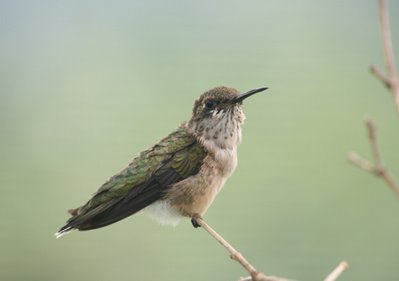 Part of conditioning this orphaned hummingbird for release is making sure he gets a high-protein diet while he's still growing. I'm holding him until Day 41 in part to make sure that he gets a decent diet, and doesn't park himself on the sugar water feeders by the front door like the clouds of other hummers at Indigo Hill. Some excellent literature written by hummingbird rehabilitator Connie Sale asserts that hummingbirds are left by their mothers to fend for themselves around Day 42-47. Which I find very interesting, because The Birds of North America (the definitive tome by the American Ornithologists' Union and the Academy of Natural Sciences) states that female hummingbirds feed their young for only 4-7 days after fledging on Day 18, which would mean the fledglings would be on their own by Day 22-25. In my experience raising hummingbirds, there's no way that can be correct. They just aren't strong enough to sustain hovering at Day 25. They spend most of their time sitting around, peeping for food and growing. How they could forage for themselves when they're that young defies logic. While I realize that captive-raised hummingbirds may not behave as do wild ones, I'd be shocked if the Birds of North America assertion were backed up by actual observations of wild birds. Hummingbirds have got to be darn tough to study, disappearing as they do in a zip, and unable to wear color bands so that individuals can be distinguished. More study of wild hummingbirds needed here! This, I believe, is a situation where rehabilitators who sub for hummingbirds' mothers can teach ornithologists a trick or two.
Part of conditioning this orphaned hummingbird for release is making sure he gets a high-protein diet while he's still growing. I'm holding him until Day 41 in part to make sure that he gets a decent diet, and doesn't park himself on the sugar water feeders by the front door like the clouds of other hummers at Indigo Hill. Some excellent literature written by hummingbird rehabilitator Connie Sale asserts that hummingbirds are left by their mothers to fend for themselves around Day 42-47. Which I find very interesting, because The Birds of North America (the definitive tome by the American Ornithologists' Union and the Academy of Natural Sciences) states that female hummingbirds feed their young for only 4-7 days after fledging on Day 18, which would mean the fledglings would be on their own by Day 22-25. In my experience raising hummingbirds, there's no way that can be correct. They just aren't strong enough to sustain hovering at Day 25. They spend most of their time sitting around, peeping for food and growing. How they could forage for themselves when they're that young defies logic. While I realize that captive-raised hummingbirds may not behave as do wild ones, I'd be shocked if the Birds of North America assertion were backed up by actual observations of wild birds. Hummingbirds have got to be darn tough to study, disappearing as they do in a zip, and unable to wear color bands so that individuals can be distinguished. More study of wild hummingbirds needed here! This, I believe, is a situation where rehabilitators who sub for hummingbirds' mothers can teach ornithologists a trick or two.When I raised three baby hummingbirds in 2003, I released them on Day 32, then wound up having to feed them with a dropper--outside, in the yard--until Day 36. Now, that was a job. Good thing they answered to their names with a peep, so I could find them, and learned to come down to find me when they were hungry. On Day 36, I reduced their subsidy to one feeding before they went to roost in various trees and shrubs around the yard. All I had to go by was the Birds of North America account, and by those standards, it seemed as though my birds were being big ol' babies, and should have been independent ten days earlier. Not so. I was actually kicking them out into the world before they were truly ready. Still, they all made it to return the following spring! The things you learn when you live with birds and talk to other rehabilitators...
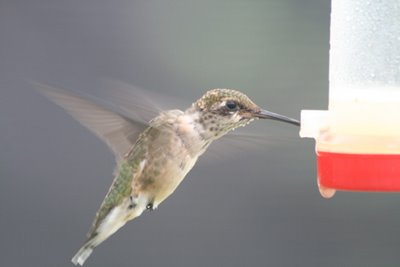 Magic, on the other hand, has been self-feeding since a week before he fledged (which could explain some of his messy chin feathers!) He's a snap to care for, much easier than my spoiled hummingbirds from 2003. I mix fresh formula three times a day, and wash the feeder each time, to keep things from spoiling in the heat and humidity.
Magic, on the other hand, has been self-feeding since a week before he fledged (which could explain some of his messy chin feathers!) He's a snap to care for, much easier than my spoiled hummingbirds from 2003. I mix fresh formula three times a day, and wash the feeder each time, to keep things from spoiling in the heat and humidity.It's great fun to introduce him to different flowers, including geraniums, snapdragons, delphiniums, gladiloi, mandevilla, impatiens, and cardinalflower.
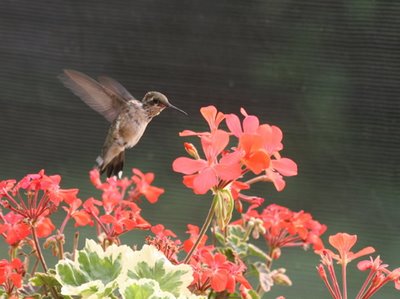 He eagerly checks out each one as I bring it in, and visits them constantly throughout the day. I see him flycatching gnats and whitefly.
He eagerly checks out each one as I bring it in, and visits them constantly throughout the day. I see him flycatching gnats and whitefly.The plan is to release him and continue putting his protein solution out for him, in the Little Beginner feeder he's become familiar with.
With each passing day he gets more attractive; his feathers benefit from regular mist baths. After I spray down the enclosure, hopefully getting him doused too, he sneaks in and wallows around on the wet geranium leaves.
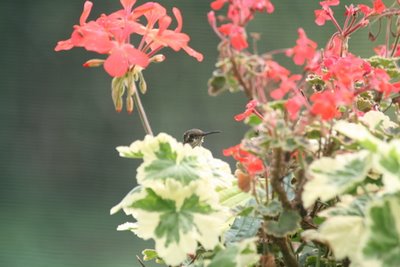 Such a wary little thing he is; I have to use the 300 mm. lens on him just as I would on a wild hummmingbird. It'll be interesting to see if he keeps his standoffish ways after release. I'm looking forward to it. He certainly has a built-in social group to bicker with here!
Such a wary little thing he is; I have to use the 300 mm. lens on him just as I would on a wild hummmingbird. It'll be interesting to see if he keeps his standoffish ways after release. I'm looking forward to it. He certainly has a built-in social group to bicker with here!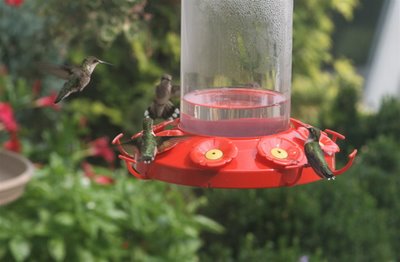 When it's full, this Perky Pet feeder is so heavy I can hardly lift it above my head. It takes my crowd three days to drain it! So there will be no lack of company for Magic. Even now I see hummingbirds hovering in front of his tent netting and perching in the birches close to him. "What are you in for?"
When it's full, this Perky Pet feeder is so heavy I can hardly lift it above my head. It takes my crowd three days to drain it! So there will be no lack of company for Magic. Even now I see hummingbirds hovering in front of his tent netting and perching in the birches close to him. "What are you in for?""Fell out of my nest, into a puddle."
"Bummer, man. When do you get out?"
"Gotta hang in until Day 41. Got any smokes?"
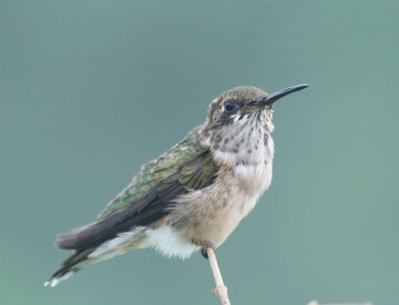
Labels: age at independence of hummingbirds, fledgling period of ruby-throated hummingbird, releasing orphaned hummingbirds

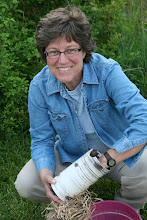

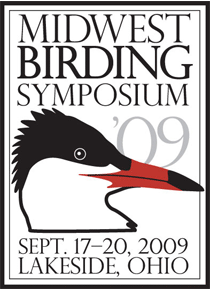
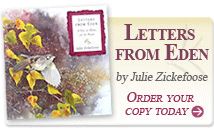

<< Home